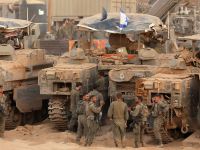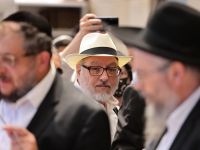Israeli Foreign Minister Shimon Peres on Monday pledged immediate steps to ease restrictions on the Palestinians as part of efforts to end the ongoing violence, but hopes for peace remained slim.
Israel late Sunday denied an announcement in Cairo that a ceasefire had been agreed and Palestinians reported no fruit from security talks.
Peres outlined the measures after a day of marathon talks that started in Cairo with Egyptian President Hosni Mubarak and ended with Jordan's King Abdullah II at the Red Sea resort of Aqaba, said AFP.
However, the Jordanian foreign minister, Abdel Ilah Khatib, told AFP Peres' talks with Amman had allowed "some movement but it is not enough."
Peres also submitted his government's official response to a joint Egyptian-Jordanian bid to end the seven-month old bloodletting sparked by a Palestinian revolt against Israeli occupation.
"Peres informed the king that Israel will begin from today to take measures to reduce the restriction on the Palestinian territories, including the reopening of the Gaza airport," a court spokesman told AFP.
The measures outlined by Peres also call for "an increase in the number of permits allocated to Palestinian workers in Israel and an improvement of conditions for Palestinian fishermen," the spokesman said, cited by AFP.
The king stressed that a "total lift of the (Israeli-imposed) blockade (of Palestinian territories) was an essential condition to create the favorable climate for a resumption of peace talks", the spokesman said.
But Peres said late Sunday that, contrary to what Egyptian President Hosni Mubarak has said earlier after the two met in Cairo, no ceasefire agreement had been concluded with the Palestinians.
Army radio quoted Peres as saying that Mubarak "had made a mistake" and that "no agreement on a ceasefire had been signed," said AFP.
Mubarak had told reporters after meeting Peres that "The Israelis and Palestinians have agreed to a ceasefire, on both sides," citing a letter he had received from Israel's Prime Minister Ariel Sharon.
However, Mubarak did not say when a truce would take effect and both Peres and Egyptian Foreign Minister Amr Moussa stopped short of announcing a ceasefire agreement.
Peres, the highest Israeli official to visit Jordan since the rightwing administration of Sharon took office in March, outlined to Abdullah his country's "remarks" on the Jordanian-Egyptian plan, said Haaretz newspaper.
"Some of these remarks deal with wording (contained in the plan) while others are issues of principles," an official told the paper.
"Jordan will hold consultations with Egypt before responding to the Israeli remarks," he said.
On April 16, Khatib submitted the proposals to Israel aimed at quelling the violence. They call for confidence building measures, including a halt to Israel's settlement activities and a resumption of negotiations that preserves progress made during previous failed talks.
But hard-line Sharon has rejected key elements of the plan, such as a freeze on building in the Jewish settlements of the West Bank and Gaza Strip, and the eventual resumption of peace negotiations from where they left off in October without a signed agreement.
And in a telephone conversation with the king before he met Peres Sharon said Israel would not negotiate before "a complete halt to terror", meaning any form of violent protest.
Top Palestinian negotiator Saeb Erakat spoke Sunday of "progress" linked to the Jordanian-Egyptian plan after talks in Amman with the Jordanian foreign minister. But he did not elaborate.
The European Union's senior foreign policy representative Javier Solana gave his support to the Jordanian-Egyptian peace plan during a meeting with Erakat in the West Bank town of Jericho, Erakat said.
In Washington, a State Department official said Sunday that the United States "welcomes any steps in ending the violence" in the Middle East.
ARAFAT ‘SURPRISED’ BY MUBARAK ANNOUNCEMENT OF CEASEFIRE ACCORD
Meanwhile, Arafat seemed surprised Sunday when he learned that Mubarak had announced a ceasefire accord between Israelis and Palestinians, said head of Israel’s Meretz party leader, Yossi Sarid.
He was cited by Haaretz as telling army radio that he was talking to Arafat when the news was given to the Palestinian leader, who immediately called Egyptian Foreign Minister Amr Moussa, Sarid said.
"Yes, he appeared quite surprised," he said of Arafat.
Sarid said he had handed Arafat a proposal from his party, which has 10 seats in the 120-member Israeli parliament, that the Palestinians end their violent uprising in exchange for a halt to Israeli settlement building in the Palestinian territories.
Sharon has said expansion of existing settlements will continue.
Sarid said he was "very pessimistic" about the chances of a ceasefire coming about, adding that a halt to settlements was an extremely sensitive and crucial point for the Palestinians, according to Haaretz.
MOUSSA, PERES TRADE HOT WORDS ON ISRAELI, ARAB RACISM
AFP reported that Peres and his Egyptian counterpart Moussa on Sunday traded accusations of Israeli and Arab racism that was sparked by a photograph of Peres dressed as a Nazi published by an opposition newspaper.
"I do not think that anybody can accept me in a uniform of a Nazi," Peres told reporters after talks in Cairo on ways to end Palestinian-Israeli violence and resume peace talks.
"I think that it hurts me, but it hurts more the paper," Peres said after an Israeli journalist asked him to comment on the photo which appeared Sunday in the Egyptian opposition newspaper Al-Arabi.
The paper superimposed a picture of Peres on that of a Nazi and branded the image with a swastika, said the agency.
An angry Moussa jumped into the debate and suggested there was Israeli hypocrisy as he recalled remarks from Israeli rabbis who denounced Arabs as snakes and cockroaches and who said God had regretted creating them.
"This is anti-Semitism," he said, adding Arabs were also Semites. "So if you want to open the file, we have to open the file in full."
"There is no one-way traffic on this," Moussa said.
Both Moussa and Peres agreed such hatred had to stop.
"All of us have to make a rule to stop incitement and stop the accusations that lead nowhere," Peres said. "It leads to hate and violence and crisis."
"I agree and I believe all of us agree that incitement to hatred has to stop and to come to an end. It serves no purpose," Moussa was quoted as saying.
An Egyptian court on Tuesday began hearing a defamation case against the outspoken spiritual leader of Israel's powerful ultra-Orthodox Jewish party Shas, Rabbi Ovadia Yosef, who had reportedly called for the annihilation of Arabs.
The rabbi later backtracked.
"I want to make clear that my remarks were aimed solely at terrorists who blindly kill the innocent," he said in a statement published in the daily Yediot Aharonot.
Yosef, who is one of the most powerful figures in Israel as a former chief rabbi and founder of Shas, the third largest party in parliament which represents the nation's Sephardic Jews, has made similarly vitriolic remarks in the past, several times calling Arabs "vipers."
ESCALATION CONTINUES IN PALESTINIAN TERRITORIES
Violence went on unabated in Israel and the Palestinian territories on Sunday and an armed branch of Palestinian President Yasser Arafat's Fateh organization vowed to "continue its fight" against Israel, despite orders from the Palestinian Authority to disband, said reports.
"We will continue the fight against the occupation," the Committees of Popular Resistance said in a statement issued in Gaza, adding that they saw "no justification" for the order that was issued on Saturday.
The high council for Palestinian national security, acting on Arafat's instructions, decided late Saturday to disband the committees, following Fateh's claim of responsibility for launching mortar bombs at Israeli settlements in the Gaza Strip.
The council also resolved to prevent such activity and step up patrols to this end.
Despite the move, mortar bombs fell Sunday on the Kfar Darom settlement, causing no casualties, according to an Israeli military spokesman.
The committees of popular resistance were formed after the start of the Palestinian Intifada.
They have claimed various anti-Israeli operations in the occupied territories.
Meanwhile, Haaretz reported that an Israeli soldier was lightly wounded overnight when Palestinian gunmen opened fire at the entrance to the settlement of Morag in the Gaza Strip.
Palestinians also fired at the settlements of Kadim and Ofra, in the northern portion of the West Bank on Sunday night, the paper said, adding that Israeli troops returned fire.
According to the paper, shots were exchanged Sunday evening between Israeli troops and Palestinians in the Neve Dekalim industrial zone and near the settlement of Ganei Tal in the Gaza Strip.
Israel Radio reported that Israeli tanks fired at a Palestinian position near Neve Dekalim. A Palestinian boy was injured in the incident.
Also, an Israeli was lightly wounded by rocks thrown at the vehicle in which he was driving on the Houssan bypass road near Bethlehem, the paper added.
In the vicinity of Dir al Balah in Gaza, Israeli troops shot several tank shells at Palestinian positions – Albawaba.com
© 2001 Al Bawaba (www.albawaba.com)







